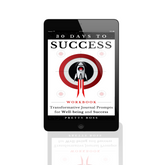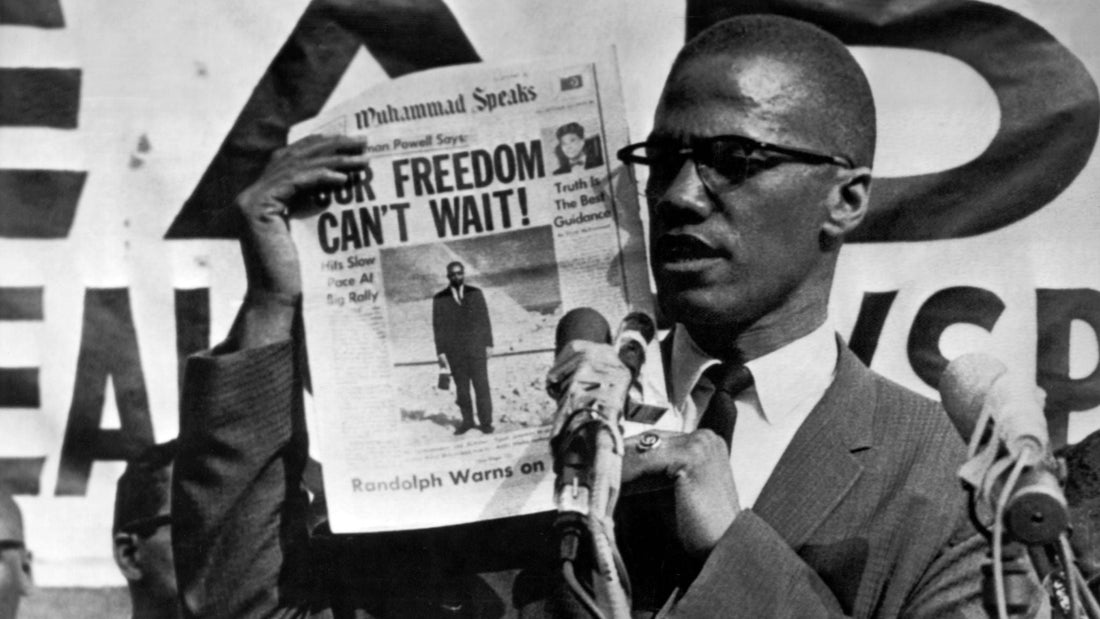⏳ 6 min read | by Pretty Boss
Malcolm X: Leadership, Legacy, and the Price of Standing for Something
Black History Month is more than just a time to reflect on the past. It's a call to action for the present and future. As someone who believes in leadership, independence, and the power of self-determination, I find Malcolm X to be one of the most powerful figures to learn from. His journey was not just about personal transformation; it was about empowering others to step into their own power and lead.
 As Malcolm X once said, "A man who stands for nothing will fall for anything." That quote is the foundation of what I want to impart to my audience. In a world where distractions, misinformation, and external forces pull people in every direction, true leadership requires a clear stance, a purpose, and the courage to act on it. Let’s take a deeper look at the life of Malcolm X, his struggles, his victories, and the lessons his leadership leaves behind for us today.
As Malcolm X once said, "A man who stands for nothing will fall for anything." That quote is the foundation of what I want to impart to my audience. In a world where distractions, misinformation, and external forces pull people in every direction, true leadership requires a clear stance, a purpose, and the courage to act on it. Let’s take a deeper look at the life of Malcolm X, his struggles, his victories, and the lessons his leadership leaves behind for us today.
 The Early Life of Malcolm X: A Leader in the Making
The Early Life of Malcolm X: A Leader in the Making
Born Malcolm Little in 1925, Malcolm X came into a world already shaped by racial injustice and systemic oppression. His father, Earl Little, was a follower of Marcus Garvey, a leader who preached Black self-reliance and global unity. Because of his father's activism, their family faced constant threats from white hate groups, including the Ku Klux Klan. When Malcolm was just six years old, his father was killed in what was ruled an accident. But many believe it was a racially motivated assassination.
 His mother, Louise Little, struggled to keep the family together, but the pressure of racism and financial hardship led to her institutionalization, leaving Malcolm and his siblings to be split up in the foster care system. From a young age, Malcolm saw firsthand how society sought to strip Black people of their identity, agency, and stability. Despite being an exceptional student, he was discouraged from pursuing a professional career. His white teacher told him that being a lawyer wasn’t a “realistic” goal for a Black boy.
His mother, Louise Little, struggled to keep the family together, but the pressure of racism and financial hardship led to her institutionalization, leaving Malcolm and his siblings to be split up in the foster care system. From a young age, Malcolm saw firsthand how society sought to strip Black people of their identity, agency, and stability. Despite being an exceptional student, he was discouraged from pursuing a professional career. His white teacher told him that being a lawyer wasn’t a “realistic” goal for a Black boy.
This was the first time Malcolm experienced what so many of us face: a system that tries to define us, limit us, and dictate our future. But he was destined for more.
Trials and Transformation: Finding Purpose
By his teenage years, Malcolm had turned to a life of hustling, crime, and survival in the streets of Boston and Harlem. His sharp mind and natural leadership abilities made him a powerful figure in the underworld, but it also led to his downfall. In 1946, at the age of 20, he was sentenced to ten years in prison for burglary.
 Prison was the turning point. Instead of allowing the system to break him, he used it as an opportunity to rebuild himself. He educated himself, reading every book he could get his hands on. More importantly, he was introduced to the teachings of the Nation of Islam (NOI), which emphasized Black empowerment, self-sufficiency, and the rejection of white "supremacy".
Prison was the turning point. Instead of allowing the system to break him, he used it as an opportunity to rebuild himself. He educated himself, reading every book he could get his hands on. More importantly, he was introduced to the teachings of the Nation of Islam (NOI), which emphasized Black empowerment, self-sufficiency, and the rejection of white "supremacy".

This was a pivotal moment because Malcolm X didn’t just transform himself. He became a leader who would challenge the status quo. His past didn’t define him; rather, it prepared him for the leader he was becoming. He emerged from prison not as Malcolm Little, but as Malcolm X, a name symbolizing the unknown African heritage that had been stolen from his ancestors.
Leadership in Action: The Rise of a Revolutionary
Malcolm X quickly rose through the ranks of the Nation of Islam, becoming its most powerful spokesperson. His charisma, intelligence, and fearless approach to truth-telling made him one of the most electrifying voices of the civil rights era. He preached Black self-reliance, economic empowerment, and the right to defend oneself against oppression.
 Unlike the mainstream civil rights movement, which emphasized nonviolence and integration, Malcolm X stood firm in the belief that Black people needed to build their own power structures, their own communities, and their own economic systems. He understood something that I often emphasize to my audience: true independence comes from ownership. Ownership of your mindset, your resources, and your destiny.
Unlike the mainstream civil rights movement, which emphasized nonviolence and integration, Malcolm X stood firm in the belief that Black people needed to build their own power structures, their own communities, and their own economic systems. He understood something that I often emphasize to my audience: true independence comes from ownership. Ownership of your mindset, your resources, and your destiny.
 His speeches challenged the hypocrisy of American democracy, exposing the deep-seated racism embedded in every system. He forced people to confront uncomfortable truths, and as a result, he was both deeply loved and fiercely hated. But that is the price of true leadership: standing firm, even when it makes others uncomfortable.
His speeches challenged the hypocrisy of American democracy, exposing the deep-seated racism embedded in every system. He forced people to confront uncomfortable truths, and as a result, he was both deeply loved and fiercely hated. But that is the price of true leadership: standing firm, even when it makes others uncomfortable.
Breaking Free and Evolving
By 1964, Malcolm X had begun to evolve beyond the Nation of Islam. After making a pilgrimage to Mecca, he saw a broader, more unifying vision for the fight against oppression. He realized that the struggle wasn’t just about race. It was about power, class, and global systems of control. He founded the Organization of Afro-American Unity (OAAU), which aimed to connect the struggles of Black people in America with those across the African diaspora.
 This shift made him even more dangerous to those in power. He was no longer just an advocate for Black nationalism. He was now a global revolutionary. He was building alliances beyond race, challenging governments, and encouraging people to think for themselves.
This shift made him even more dangerous to those in power. He was no longer just an advocate for Black nationalism. He was now a global revolutionary. He was building alliances beyond race, challenging governments, and encouraging people to think for themselves.
This resonates deeply with my own mission and what I teach: the power of sovereignty, self-reliance, and breaking free from limiting belief systems. Leadership isn’t about staying in one ideology forever. It’s about growing, adapting, and always aligning with higher truth.
Assassination and Immortality
On February 21, 1965, Malcolm X was assassinated in front of his wife and children while delivering a speech in Harlem. Many believe his death was orchestrated not just by enemies within the Nation of Islam but by government forces that saw him as a threat. He was only 39 years old, yet his impact was immeasurable.
 But Malcolm X did not die. His body may have been taken, but his words, his legacy, and his spirit live on. His autobiography continues to inspire generations. His speeches still ignite fire in the hearts of those seeking truth. His message of empowerment, self-determination, and unwavering leadership is as relevant today as it was then.
But Malcolm X did not die. His body may have been taken, but his words, his legacy, and his spirit live on. His autobiography continues to inspire generations. His speeches still ignite fire in the hearts of those seeking truth. His message of empowerment, self-determination, and unwavering leadership is as relevant today as it was then.
Lessons in Leadership: What Malcolm X Taught Us
Malcolm X’s life was a testament to what it means to lead:
✅ Stand for something: “A man who stands for nothing will fall for anything.” Never let society, fear, or convenience dictate your values. Define them for yourself.
✅ Never stop evolving: Malcolm X grew and transformed throughout his life. True leaders are never stagnant—they are always learning, questioning, and refining their purpose.
✅ Empower others: He didn’t just seek personal success. He wanted to uplift an entire people. Leadership is not about self-glorification; it’s about service.
✅ Prepare for opposition: When you take a stand, expect resistance. Expect criticism. But keep going. Because history does not remember the fearful. It remembers the bold.
 Final Thought: Will You Lead or Follow?
Final Thought: Will You Lead or Follow?
As we honor Malcolm X this Black History Month, let his life be more than just history. Let it be a mirror for us. Are we standing for something? Are we leading, or are we waiting for permission?
This is not just a time to reflect. It’s a time to act.
What do you stand for?
The answer to that question will determine whether you rise as a leader. Or whether you fall for anything.
Watch Malcolm X starring Denzel Washington Directed by Spike Lee
 If you haven't seen Malcolm X, now is the perfect time to watch this powerful biographical film directed by Spike Lee and starring Denzel Washington in an unforgettable performance. The movie chronicles the life, transformation, and legacy of Malcolm X, one of the most influential figures in American history. From his early struggles to his rise as a revolutionary leader, this film captures his journey with depth and intensity. You can stream Malcolm X on Max or watch it on Hulu.
If you haven't seen Malcolm X, now is the perfect time to watch this powerful biographical film directed by Spike Lee and starring Denzel Washington in an unforgettable performance. The movie chronicles the life, transformation, and legacy of Malcolm X, one of the most influential figures in American history. From his early struggles to his rise as a revolutionary leader, this film captures his journey with depth and intensity. You can stream Malcolm X on Max or watch it on Hulu.






















